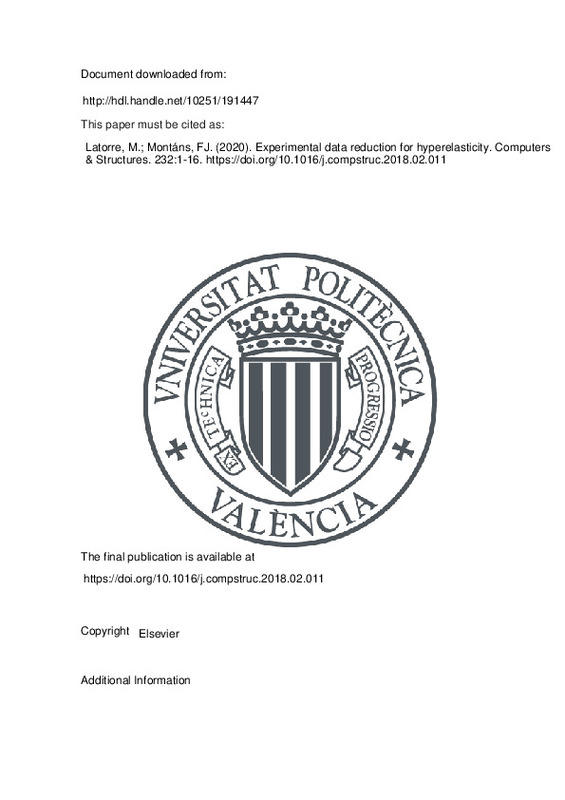JavaScript is disabled for your browser. Some features of this site may not work without it.
Buscar en RiuNet
Listar
Mi cuenta
Estadísticas
Ayuda RiuNet
Admin. UPV
Experimental data reduction for hyperelasticity
Mostrar el registro sencillo del ítem
Ficheros en el ítem
| dc.contributor.author | Latorre, Marcos
|
es_ES |
| dc.contributor.author | Montáns, Francisco Javier
|
es_ES |
| dc.date.accessioned | 2023-01-23T19:00:43Z | |
| dc.date.available | 2023-01-23T19:00:43Z | |
| dc.date.issued | 2020-05 | es_ES |
| dc.identifier.issn | 0045-7949 | es_ES |
| dc.identifier.uri | http://hdl.handle.net/10251/191447 | |
| dc.description.abstract | [EN] WYPiWYG hyperelasticity is a data-driven, model-free computational procedure for finite element analysis of soft materials. The procedure does not assume the shape of the stored energy function and does not employ material parameters, predicting accurately any smooth prescribed behavior from a complete set of experimental tests. However, fuzzy experimental data may yield useless highly oscillatory, unstable stored energy functions, and classical curvature smoothing frequently gives unsatisfactory results. Aside, the possibility of having experimental data from different specimens for the same test was not considered in previous procedures. In this work we present a novel technique based on spline regression and smoothing penalization using stability conditions. In general, this procedure reduces noisy experimental data or data from multiple specimens for ulterior determination of the stored energy. The procedure only needs the solution of a linear system of equations. Instead of classical curvature-based smoothing, we employ a novel stability-based smoothing, determining for each branch of the uniaxial stress-strain curve the most restrictive stability condition during uniaxial and equibiaxial tests. The resulting stored energy functions are smooth and stable. The procedure has little sensitivity to the number of spline segments or to the choice of the penalization parameter, which are computed automatically. | es_ES |
| dc.description.sponsorship | Partial financial support for this work has been given by grant DPI2015-69801-R from the Direccion General de Proyectos de Investigacion of the Ministerio de Economia y Competitividad of Spain | es_ES |
| dc.language | Inglés | es_ES |
| dc.publisher | Elsevier | es_ES |
| dc.relation.ispartof | Computers & Structures | es_ES |
| dc.rights | Reconocimiento - No comercial - Sin obra derivada (by-nc-nd) | es_ES |
| dc.subject | Hyperelasticity | es_ES |
| dc.subject | WYPiWYG hyperelasticity | es_ES |
| dc.subject | Soft materials | es_ES |
| dc.subject | Biological tissues | es_ES |
| dc.subject | Stability | es_ES |
| dc.title | Experimental data reduction for hyperelasticity | es_ES |
| dc.type | Artículo | es_ES |
| dc.identifier.doi | 10.1016/j.compstruc.2018.02.011 | es_ES |
| dc.relation.projectID | info:eu-repo/grantAgreement/MINECO//DPI2015-69801-R/ES/MODELADO Y SIMULACION DEL COMPORTAMIENTO MECANICO DE MATERIALES BLANDOS ANISOTROPOS EN GRANDES DEFORMACIONES/ | es_ES |
| dc.relation.projectID | info:eu-repo/grantAgreement/MINECO//DPI2015-69801-R//Modelado y simulación del comportamiento mecánico de materiales blandos anisótropos en grandes deformaciones/ | es_ES |
| dc.rights.accessRights | Abierto | es_ES |
| dc.description.bibliographicCitation | Latorre, M.; Montáns, FJ. (2020). Experimental data reduction for hyperelasticity. Computers & Structures. 232:1-16. https://doi.org/10.1016/j.compstruc.2018.02.011 | es_ES |
| dc.description.accrualMethod | S | es_ES |
| dc.relation.publisherversion | https://doi.org/10.1016/j.compstruc.2018.02.011 | es_ES |
| dc.description.upvformatpinicio | 1 | es_ES |
| dc.description.upvformatpfin | 16 | es_ES |
| dc.type.version | info:eu-repo/semantics/publishedVersion | es_ES |
| dc.description.volume | 232 | es_ES |
| dc.relation.pasarela | S\472035 | es_ES |
| dc.contributor.funder | Ministerio de Economía y Competitividad | es_ES |
| dc.subject.ods | 03.- Garantizar una vida saludable y promover el bienestar para todos y todas en todas las edades | es_ES |







![[Cerrado]](/themes/UPV/images/candado.png)

